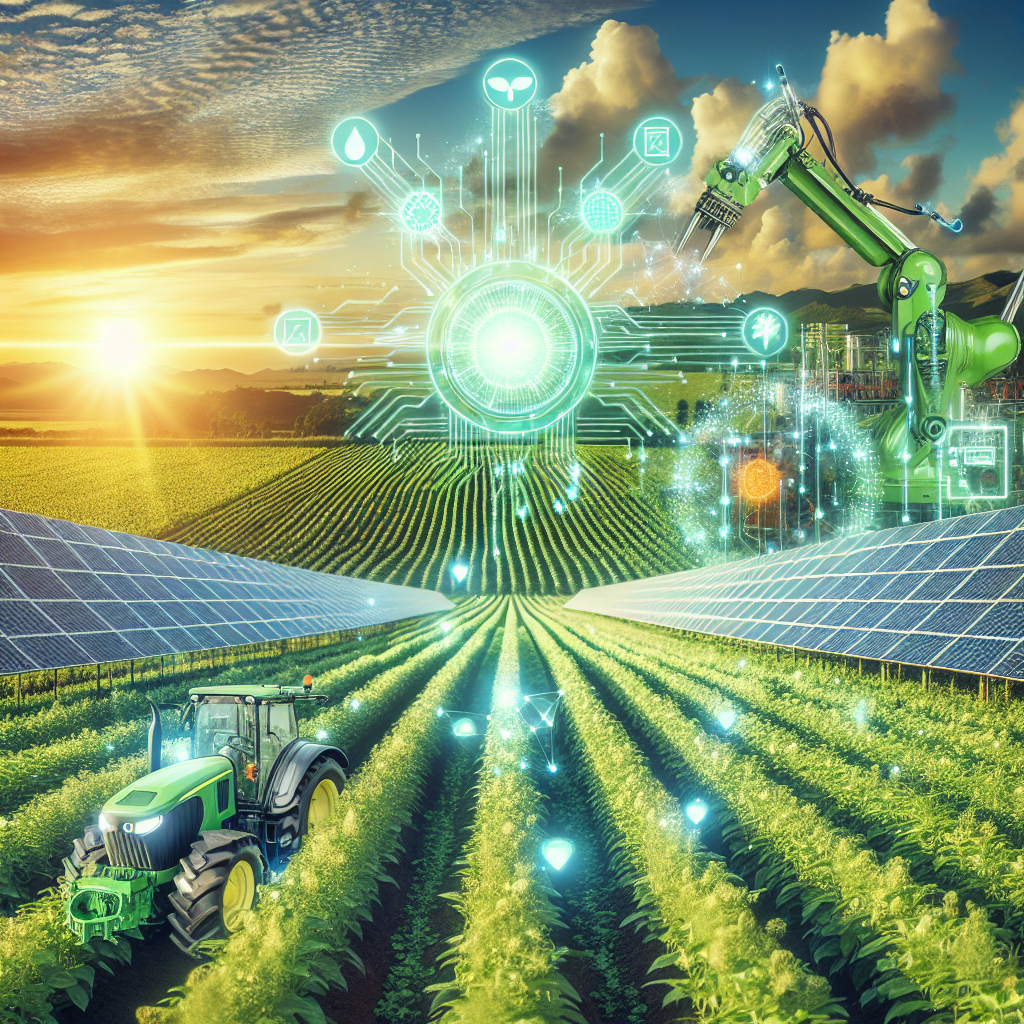Artificial Intelligence (AI) has the potential to revolutionize the way we approach sustainable agriculture, offering innovative solutions to some of the biggest challenges facing the industry today. From optimizing crop yields to reducing waste and improving resource efficiency, AI technologies are already making a significant impact on the way we grow and produce food. In this article, we will explore the role of AI in sustainable agriculture and how it is helping to cultivate a brighter future for farmers, consumers, and the planet.
The Importance of Sustainable Agriculture
Sustainable agriculture is essential for ensuring the long-term health and viability of our food systems. With a growing global population and increasing pressure on natural resources, it is more important than ever to adopt practices that promote environmental stewardship, social responsibility, and economic viability. Sustainable agriculture aims to minimize the negative impacts of farming on the environment, while maximizing the benefits for farmers, consumers, and communities.
Key challenges facing the agriculture industry today include climate change, soil degradation, water scarcity, pest and disease outbreaks, and food waste. These challenges are exacerbated by traditional farming practices that rely heavily on chemical inputs, monocropping, and inefficient use of resources. Sustainable agriculture seeks to address these challenges by promoting practices that are environmentally friendly, economically viable, and socially responsible.
The Role of AI in Sustainable Agriculture
AI technologies have the potential to transform the way we approach sustainable agriculture, offering innovative solutions to some of the biggest challenges facing the industry today. By leveraging the power of big data, machine learning, and advanced analytics, AI can help farmers make better decisions, optimize crop yields, reduce waste, and improve resource efficiency.
One of the key applications of AI in agriculture is precision farming, which involves using data-driven insights to optimize crop management practices. By analyzing data from sensors, drones, satellites, and other sources, AI algorithms can help farmers make more informed decisions about when to plant, irrigate, fertilize, and harvest crops. This can lead to higher yields, lower input costs, and reduced environmental impact.
Another important application of AI in agriculture is pest and disease management. By analyzing patterns in data, AI algorithms can help farmers identify and respond to pest and disease outbreaks more quickly and effectively. This can help reduce the need for chemical pesticides and minimize crop losses, leading to healthier crops and higher yields.
AI technologies can also help reduce food waste by optimizing supply chain logistics, predicting demand, and improving storage and distribution practices. By using AI algorithms to analyze data on consumer preferences, market trends, and weather patterns, farmers and food producers can better match supply with demand, reduce spoilage, and minimize losses throughout the food chain.
Overall, AI has the potential to revolutionize the way we grow and produce food, making agriculture more sustainable, efficient, and resilient in the face of climate change and other challenges. By harnessing the power of AI technologies, farmers can improve productivity, reduce waste, and ensure the long-term health and viability of our food systems.
FAQs about AI and Sustainable Agriculture
Q: What are some examples of AI technologies being used in sustainable agriculture?
A: Some examples of AI technologies being used in sustainable agriculture include precision farming, pest and disease management, food waste reduction, and supply chain optimization. These technologies leverage the power of big data, machine learning, and advanced analytics to help farmers make better decisions, optimize resource use, and reduce environmental impact.
Q: How can AI help farmers improve crop yields?
A: AI can help farmers improve crop yields by analyzing data from sensors, drones, satellites, and other sources to optimize crop management practices. By providing insights on when to plant, irrigate, fertilize, and harvest crops, AI algorithms can help farmers make more informed decisions that lead to higher yields and lower input costs.
Q: How can AI help reduce food waste in agriculture?
A: AI can help reduce food waste in agriculture by optimizing supply chain logistics, predicting demand, and improving storage and distribution practices. By analyzing data on consumer preferences, market trends, and weather patterns, AI algorithms can help farmers and food producers better match supply with demand, reduce spoilage, and minimize losses throughout the food chain.
Q: What are some of the challenges facing the adoption of AI in sustainable agriculture?
A: Some of the challenges facing the adoption of AI in sustainable agriculture include high costs, data privacy concerns, and the need for technical expertise. AI technologies can be expensive to implement and require significant investment in infrastructure and training. Data privacy concerns also pose a challenge, as farmers and food producers must ensure that sensitive information is protected. Additionally, the complexity of AI technologies may require specialized skills and expertise that are not always readily available in the agriculture industry.
Q: What are some of the potential benefits of AI in sustainable agriculture?
A: Some of the potential benefits of AI in sustainable agriculture include higher crop yields, lower input costs, reduced environmental impact, and improved resource efficiency. By leveraging the power of AI technologies, farmers can make better decisions, optimize resource use, and minimize waste, leading to more sustainable and resilient food systems.
In conclusion, AI technologies have the potential to revolutionize the way we approach sustainable agriculture, offering innovative solutions to some of the biggest challenges facing the industry today. By leveraging the power of big data, machine learning, and advanced analytics, AI can help farmers make better decisions, optimize crop yields, reduce waste, and improve resource efficiency. With the adoption of AI technologies, farmers can cultivate a brighter future for themselves, consumers, and the planet, ensuring the long-term health and viability of our food systems.

